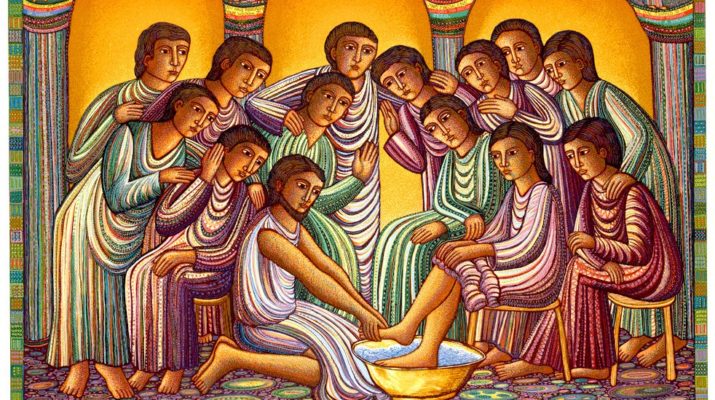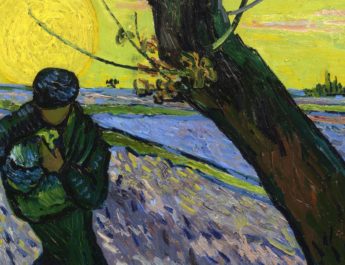John 13:31-35
Eastertide C25
31 When he had gone out,A JesusB said, “Now the SonC of ManD has been glorified,E and GodF has been glorified in him.
A “gone out” = exerchomai. From ek (from, from out of) + erchomai (to come, go). This is to go out, depart, escape, proceed from, spread news abroad.
B “Jesus” = Iesous. From Hebrew Yehoshua (Joshua, the Lord is salvation); {from YHVH (proper name of the God of Israel; the self-existent and eternal one); {from havah (to become) or from hayah (to come to pass, become, be)} + yasha (to deliver, defend, help, preserve, rescue; properly, to be open, wide or free, which implies being safe. So, in a causative sense, this is to free someone)}. This is Jesus or Joshua in Greek – the Lord saves or the Lord is salvation.
C “Son” = huios. This is son, descendant – a son whether natural born or adopted. It can be used figuratively for other forms of kinship.
D “Man” = anthropos. Probably from aner (man, male, husband) + ops (eye, face); {from optanomai (to appear, be seen); perhaps from horao (become, seem, appear)}. This is human, humankind. Used for all genders.
E “glorified” = doxazo. From doxa (glory, opinion, praise, honor, renown; particularly used as a quality of God or manifestation of God – splendor); from dokeo (to have an opinion, seem, appear, suppose; a personal judgment; to think); from dokos (opinion). This is to render or hold something as glorious, to glorify, honor, magnify, or celebrate. This is ascribing weight to something by recognizing its true value or essence.
F “God” = Theos. From Proto-Indo-European origins, meaning do, put, place. This is God or a god in general.
32 If God has been glorified in him, God will also glorify him in himself and will glorify him at once.G 33 Little children,H I am with you only a little longer.I
G “at once” = eutheos. From euthus (immediately, upright, straight and not crooked); {perhaps from eu (good, well, well done, rightly) + tithemi (to place, lay, set, establish)}. This is directly, soon, at once.
H “little children” = teknion. 8x in NT– 1x in John and 7x in 1 John. From teknon (child, descendant, or inhabitant); from tikto (to beget, bring forth, produce). This is the diminutive of teknon, so little child. Figuratively, it refers to someone who is loved, endeared, a darling. It is also used for Christian converts.
I “little longer” = mikros. This is small in reference to a size or the number of something, least or less. Figuratively, it can refer to little dignity.
You will look forJ me; and as I said to the JewsK so now I say to you, ‘Where I am going,L you cannotM come.’N
J “look for” = zeteo. This is to seek, search for, desire. It is searching for something by inquiring or investigation. It can be seek in a literal or figurative sense. There is a Hebrew figure of speech “to seek God’s face” so it can also mean to worship God. Alternately, you could seek someone’s life i.e. plot to kill them.
K “Jews” = Ioudaios. From Ioudas (Judah, Judas); from Hebrew Yehudah (Judah, son of Jacob, his tribal descendants, a name for the southern kingdom. Literally, it means praised); probably from yadah (to throw one’s hands into the air in a gesture of praise); from yad (hand). This is Jewish, a Jew, or Judea.
L “going” = hupago. From hupo (by, under, under the authority of) + ago (lead, bring, guide, spend, drive, carry). This is to lead under so to depart, go away, or die. It is to lead away under the command of someone else, being given a mission or objective to carry out.
M “cannot” = ou + dunamai. Dunamai is to be able, or something that is possible. It can also be empowered or being powerful. The Greek word for “miracle” (dunamis) comes from this root.
N “come” = erchomai. Related to “gone out” in v31. See note A above.
34 I giveO you a newP commandment,Q that you loveR one another. Just as I have loved you, you also should love one another.
O “give” = didomi. To give, offer, place, bestow, deliver. This is give in a literal or figurative sense.
P “new” = kainos. This is not new as in new versus old. This is new in the sense of novel, innovative, or fresh.
Q “commandment” = entole. From entellomai (to charge, command, give orders or instructions) {from en (in, on, at, by, with) + tellomai (to accomplish); {from telos (an end, aim, purpose, completion, end goal, consummation, tax; going through the steps to complete a stage or phase and then moving on to the next one)}}. This is an order, command, ordinance, or law. It focuses on the purpose of the command and its end result.
R “love” = agapao. Perhaps from agan (much). This is love, longing for, taking pleasure in. It is divine love or human love that echoes divine love.
35 By this everyoneS will knowT that you are my disciples,U if you haveV loveW for one another.”
S “everyone” = pas. This is all or every.
T “know” = ginosko. This is to know, recognize, realize, perceive, learn. It is knowledge gained through personal experience.
U “disciples” = mathetes. From matheteuo (to make a disciple of); from manthano (to learn key facts, gain knowledge from experience; generally implies reflection as part of the learning process); from math– (thinking things through). This is a disciple, learner, or student. It is where we get “mathematics” from.
V “have” = echo. This is to have, hold, possess.
W “love” = agape. Related to “love” in v34. From agapao (see note R above). This is love, goodwill, benevolence. It is God’s divine love or human love that mirrors God’s love.
Image credit: “Washing of the Feet” by John August Swanson, 1999.




